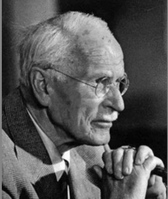 After posting my recent blog entry on happiness, a reader sent me this opinion of Swiss psychiatrist Carl Jung. He felt happiness was built on five pillars: 1)Good physical and mental health (Jung believed that getting happier required soundness of mind and body.) 2)Good personal and intimate relations, such as those of marriage, family, and friendships 3)Seeing beauty in art and in nature (Jung felt that happiness required one to cultivate an appreciation for beautiful things and experiences.) 4)A reasonable standard of living and satisfactory work (Older studies show that well-being tops out at relatively low income levels, but more recent studies show that such contentment continues to rise for much higher incomes. Having the money to pay for experiences with loved ones, to free up time to spend on meaningful activities, and to support good causes does enhance happiness.) 5)A philosophical or religious outlook that fosters resilience (Jung was the son of a pastor and felt that religious belief is strongly predictive of finding meaning in life. He also stated that spirituality is positively correlated with better mental health; both faith and spiritual practice seem protective against depression.) If Carl Jung were alive today, I do think he’d agree: being happy matters.
0 Comments
Sad news from Time Magazine captured in this headline:
“Happiness in the U.S.: A new low” As dispiriting as that is, let’s remember that achieving happiness in your life is not rocket science. It can be a course of action. Have a look at Finland. My soon-to-be-released book “Being Happy Matters” (beinghappymatters.life) reveals Finland at the top of Gallup’s World Happiness List – for the 7th year in a row. Why? The answer can be found in the fact that Finland’s society has developed what they call an infrastructure of happiness. Happiness matters. And they make a point of finding it in the economy, healthcare, education, human rights, democratic governance and a culture of volunteerism. Things seem to work well in Finland. There are low levels of crime, there’s trust of the government, public transport is reliable and there is a free and independent media. Do you have a hobby? Well, Finns do and they find hobbies offering a way for people to enrich their lives and be happy doing so. They’re also a society that views and supports parents and families: the significance that Finnish people attach to Mother’s Day and Father’s Day goes beyond the days themselves. Finland is small, consistent and wealthy. Several years ago, a research paper even suggested that Finns are genetically bound to be happier. Now, this may be good news for Finns, but citizens in the U.S. do not have much to celebrate. For the first time in the 12 year history of the World Happiness Report, the U.S. failed to show in the top 20 of the world’s happiest countries. Look at the decline: of the more than 140 countries surveyed, the U.S. ranked 19 in 2021, 16 in 2022, 15 in 2023. But this year, the country has dropped to a position of 23. What's behind that? Well, it appears that the U.S. is showing a significant decline in well-being for people under the age of 30. But beyond that, despair appears to be a core public health problem. Despair has been increasing in the U. S. and the self-rated health of Americans is taking a downward turn. Even life expectancy is slowing relative to other nations. Faced with these facts, it’s not unusual for people to “throw in the towel’. But I’ve learned over the years of interviewing happy people that being happy is a choice. In fact, the people I profile in "Being Happy Matters" actually showed me how they’ve chosen to be happy... and how they keep that spirit alive. They know, as do I, that being happy does indeed matter. 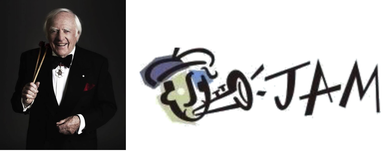 Well, here we are in April: Jazz Appreciation Month (fondly known as "JAM"), created to recognize and celebrate the heritage and history of jazz. As the website apassion4jazz.net says… “Jazz music is among America's greatest cultural achievements and exports to the world community. It gives powerful voice to the American experience. Born of a multi-hued society, Jazz unites people across the divides of race, region and national boundaries. It has always made powerful statements about freedom, creativity and identity.” You know, I’ve been a jazz fan all my life and two memories come streaming back to me as I celebrate this month. Both of them involve the late Peter Appleyard, marvelous vibraphone player. Peter had become a bit of a friend and one night, at Montreal Bistro, my dad (then in his 80s), my son Charlie (who was 17… shhhh, you were supposed to be 19 to be there) and me, then in my 50s, attended to see Peter play. He came over to our table between sets to say hi. I bought him a drink and invited him to sit. “You know Perter,” I said, “you should be pretty proud that you have here a guy in his teens, another in his 50s and still another in his 80s present to hear your music. That’s pretty much covering the waterfront!” He beamed with pleasure and announced that indeed, he was proud. When he got up to play the next set, her dedicated it to the three of us, which was awfully kind. My other memory of Peter is at a Jazz.fm concert of live musicians. It was staged at Convocation Hall, University of Toronto. My sons Charlie and Jamie took me there that evening as their guest and we sat through some wonderful acts of young jazz musicians. But then, to end the event, the announcer introduced none other than Peter Appleyard. Peter came out, played several tunes with mastery, and then, for the finale, he and the back-up group played “Frenesi”. Half way through the tune, Peter put the vibes mallets down, approached the piano and nudged his way onto the seat, pushing the pianist off. And he started playing some marvelous jazz piano rifts. But that wasn’t enough. He now went to the bassist and did the same thing, pushing the player aside and playing the bass himself with wonderful dexterity. He did this as well with the guitarist and finally ended up on the drums, performing an amazing drum solo, smiling gleefully all the while. Then he returned to the vibes to finish off the tune. My two sons could hardly believe what they had just witnessed. And the audience obviously felt the same astonishment because they immediately rose to their feet to give Peter a standing ovation. “Not bad,” I said to the boys. “An 80 year old guy performs with all these young dudes and he’s the only one who gets a standing O!” Here’s to Peter Appleyard. And here’s to Jazz Appreciation Month.  Is it just me or… wait a sec. I’m going to walk that back, because my research revealed it’s not just me. In fact, of the 10 folks I spoke to about the issue I’m about to define, every last one of them agreed with me. So, here’s the question: are members of the younger generation content to let their screaming babies wail away forever with no concern for other people in the same area (i.e. like in a plane or in a restaurant). Example: the recent 5 ½ hour flight I endured featured a baby who screamed most of the time. Despite most of us “at a certain age” staring at the mom, she seemed satisfied with avoiding any kind of discipline to hush the baby. (You always wonder if you should get up and have a chat with a parent like this, but I guess I’m just not that kind of aggressive guy. Mind you, the thought sure crossed my mind, and I’m sure it did with others.) I’ve been noticing this trend in public areas beyond airplanes as well, such as in restaurants. And it leaves me wondering: are the parents oblivious, unaware that folks nearby are not keen to hear their baby screaming ad infinitum? Or do they lack the ability to discipline the child? Or do they worry that expressing a bit of authority with the child now will provoke awful problems for the kid later on? Heck, when I raised my two sons, we did lots of travelling on airplanes. To prepare for this, I’d bring games, pacifiers, etc. Oh, and I also packed my own sense of logic for the rare moments when one of them took it upon himself to begin wailing about something. I’d let him go for just a bit, to see if this was just a momentary situation. And if not, I‘d hold the child in my arms and explain he just couldn’t bother other people by screaming. Did he understand my words? No, of course not, but you could tell he did get that I wasn’t happy about something. And he’d stopped crying, Then, I’d hold him and tell him what a great kid he was. My sons grew up normally and certainly the odd bit of discipline I applied over the years brought no ill effects into their lives. I think most of us were never afraid to inject the odd bit of discipline into the rearing of our kids. And I sure wish those up-and-coming parents would do the same thing. It’s only fair to other people around them who do not find their baby’s screaming endearing at all.  While I think the initiative to recognize Gordon Lightfoot’s talent is great, let me explain while I won’t be signing on top the recengt highway naminf petition. I think testaments showing tribute to a masterful career are a lovely idea. But to be effective, they should link to the skills of the individual being honoured. Clearly, Gord Lightfoot was not known as a highway driver. And Highway 400 does not even go near Orillia, Gord’s birthplace. Then, we have the “old habits die hard” department: it’s a truism that well established highway names are not easily relinquished. A portion of Highway 401 between Trenton and Toronto has been designated the Highway of Heroes. Been that way for 17 years. But does anyone refer to this? Nope, it’s “the 401”. Do motorists travelling along Highway 35 talk with glowing hearts about “The Midland Regiment Commemorative Highway”? Fraid not. Highway 93 is apparently the “Sarah Burke Memorial Highway”. Who’s she? Why, the champion freestyle skier from Barrie, Ont., who died from injuries sustained during a training accident back in 2012, of course. Oh… you didn’t know that. Well then, how about Angela Schmidt Foster Road? Hmmm… I can’t find anyone who knows of this highway as other than “the extension of Highway 12”. or who’s aware that the Midland resident being honoured was an Olympic cross country ski competitor. I rest my case, and that’s why my name will not be on the petition. However, while I have nothing against the current designation “Mariposa Festival”, may I propose re-naming this famous Orillia-based celebration the “Gordon Lightfoot Festival”? Might just serve as an appropriate, lasting way to remember the amazing talents of an inspired singer/songwriter, and in his hometown too.  March is Women’s History month. I’m not here to boast but I will tell you that I was a member of women’s lib before some of my female friends, so I have a long record of supporting women. Back in the day when I ran my marketing agency, any female on staff was paid the same as males, or more if they showed superior skills. They were also accorded every opportunity to excel to higher positions in the firm. I never understood why capable females would be paid less, held back or looked down upon in any way. So here in Women’s History month, let’s celebrate the strength, determination and resilience of women everywhere. Acceleration is not happening fast enough in some circles, but where it is, congrats! Let’s keep it moving!! 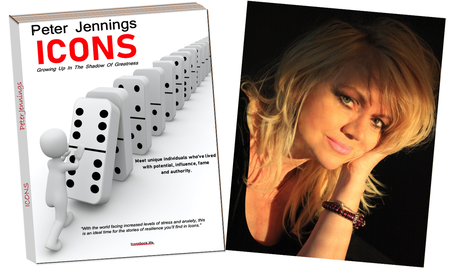 One of the benefits of being an author is that you get to create the “rules” for your books. And so it is that as I finished conducting interviews for my latest book “Icons. Growing Up in The Shadow of Greatness, I was unexpectantly introduced to an amazing woman who is an ascending singing star with a rich family background. Her name is Madonna Carew and you can learn about her at madonnacarew.com. In “Icons”, I’m profiling sons and daughters of well-known people and discussing their upbringing. I’ve been chatting with folks like Rod Roddenberry (son of the Star Trek creator); Celine Peterson (daughter of the late piano genius Oscar Peterson); Ken Ross (whose mother Elisabeth Kübler-Ross, wrote the famous book that introduced readers to the "five stages of grief"); Hoagy Bix Carmichael (son of the famed song writer); Karen Davidson (4th generation family member working for the Harley Davidson company); Tom Sandler (whose mom, Ruth Lowe, wrote the song that launched Frank Sinatra’s career into the stratosphere, “I’ll Never Smile Again”.); and many others. Now, here’s why I chose to expand the concept of the book with one chapter that profiles Madonna Carew. A performing star in her own right, Madonna is the youngest child of a family of 15 kids (yup, that’s right: 15!) She grew up in Newfoundland and eventually in Goose Bay Labrador (“It was a place of great trepidation, a place of great immorality”). She fought extreme poverty and lack of parental oversight, eventually breaking the rules to launch her singing career. She sang on air force bases at age 12, in nightclubs at 13. As I got to know her, I realized this was a reversal of the other individuals in my book: she is the star, her parents being the support team. Only, they really were not able to add the support she needed growing up, as they fought poverty and her father’s drinking. Her story is quite amazing, and surely speaks of perseverance (she is currently fast-tracked to hit the U.S. market.), and I felt it warranted exposure in the book. “Icons” will be published later this year. News of the publishing date will be available here: iconsbook.life.  Interesting to read a new article in the Globe & Mail newspaper that lives in harmony with my most recent post on this blog. The Globe story is headed “Surround Sound” and opens with, “We have been conditioned to accept a cacophony of sounds – in our cities, in our homes and in our minds. Our world grows louder, decibel by nattering decibel. It doesn’t need to be this way… there is value in the silence that our noise pollution obscures.” Columnist Michael Harris goes on to write: “In Canada, 80 per cent of us live in cities now and that means urban din. Sirens, traffic, excavators. The roar of a subway and the airplane overhead. It all adds up to an unescapable wave of sound. And this ratcheting of volume is not benign. The World Health Organization warns that urban environments now produce sound levels well above safe limits. In Europe, there are 12,000 premature deaths each year caused by the stress and cardiovascular disease brought on by excess noise.” Now, I had no idea that noise was a killer. But I do know that escaping the urban prison of sound is one of the reasons I find the Caribbean resorts I visit so relaxing. Perhaps that idea about Quiet Beaches is more and more appropriate. 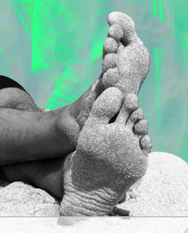 Just back from a wonderful couple of weeks at a resort in the Caribbean. Here’s something I think every island destination should consider: a “Quiet Zone” on the beach. I’m one of those guys who truly sees value in Paul Simon’s song, “The Sound of Silence”. Just listening to nothing more than the surf landing on the beach is super relaxing. But then, the sereneness is broken by a guy standing in the water, half-drunk, yelling at the top of his voice to some other guy on the beach, “Hey Jerry, grab me a brewski willya!!” Why is it the guy yelling thinks we all want to hear his voice? Having talked with lots of vacationers, they find this kind of noise oppressive too, getting in the way of the relaxation many of us have come away to enjoy. So, how about if the vacation resorts were to select an area of the beach for those of us who appreciate Mr. Simon’s sound of silence. Maybe something like a couple of hundred feet, with a sign at each end: QUIET ZONE This section of the beach between here and the next sign is for the quiet enjoyment of our guests. Please avoid making noise in this area. We offer lots of other places on the beach for lively activity and encourage you to enjoy that too. Thanks. Maybe? 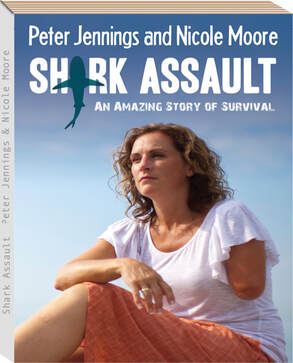 I am saddened to read today that shark deaths due to fishing have increased in recent years despite an international effort to reduce the harvesting of their fins. So says a new study that describes how shark finning – amputating a shark's fins and tail before throwing the carcass back into the water – is an awful practice. In the majority of cases, those are live animals being cast back into the sea after having their fins hacked off. Their future: a slow, dreadful death where the shark is left to bleed to death. Oh, and about one-third of those sharks killed belong to species facing extinction. I learned a lot about sharks when researching and writing my book “Shark Assault: An Amazing Story of Survival” It’s the true story of a courageous young woman, Nicole Moore from Orangeville ON, who was walking waist-deep in the ocean at a Mexican resort when she was brutally, savagely attacked twice by a bull shark. She came very close to dying, lost her arm to amputation and has since endured numerous surgeries to save her leg. Along the way, I met Claudia Li, founder of Shark Truth. She’s proudly Chinese, but she says the shark-finning process is inhumane. "Sharks are picked up and found, and they slice the fin off and they dump the rest of shark back into the ocean, and the shark's left to bleed to death," she explained. I also interviewed marine ecologist Dr. Peter Sale who told me that sharks are the “policemen” of the sea, keeping order. “If we start losing sharks, we’ll start losing the seas!” For the last word, I turn to Dalhousie University biology professor, Dr. Boris Worm. "The number of threatened shark species around the world keeps going up, not down. Very simply, we need to do more.” |
|

